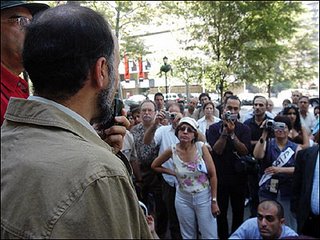
Yesterday Akbar Ganji ended his hunger strike in front of UN in New York. The participants were requesting the release of political prisoners in Iran. Event was initiated by Ganji himself in his tour around the world. Different so-called opposition groups supported the idea and there were similar gatherings in Canada, Germany and Australia. However the event in New York attracted more media attention than others. Attended by a number of activists and former reformer journalists the event was covered by even a larger number of journalists and media members.
In his final speech he said that his inspirations come from Gandhi, Mandela and Howell. He criticized those who wanted to become Chelebi’s of Iran. Emphasizing that “We exist” he added that it would be shameful to sit home and to witness bombarding Iran and then wait for a foreign government to establish a puppet democracy. He insisted that civil disobedience is the single way available to the opposition.
It must be pointed out that except for a small group of students in Tehran the event did not have much following in Iran or in numerous campuses across the country. This leaves no doubt that it was of no practical use and in reality it became an opportunity for publicity[1]. The event became a footnote with limited symbolic significance amidst the ongoing crisis in Lebanon and Iran’s domestic affairs. It is doubtful that it was even successful in pushing up human rights on western agenda.
One can’t help questioning the pragmatism behind such actions. Certainly Mr. Ganji has shown a great deal of courage and stubbornness so far, however he is an individual supported by a close but small number of friends and colleagues. He is neither a leader nor a political organizer. Although he mentions Gandhi and Mandela, he fails to point out that those were genius political leaders, both backed by a nationwide party system.
The truth is unlike Gandhi and Mandela, Mr. Ganji lacks a popular objective. Before Gandhi was a leader of non-violence, he was a freedom-fighter for India. Mandela in his own turn fought for a South Africa free of apartheid. Both goals appealed enormously to simple ordinary people. One feels justified in pointing out that it does seem Mr. Ganji and his followers lack such popular causes. They might be successful in persuading western leaders that there is a democracy movement in Iran. But their achievements end there for time being.
[1] Writer does not suggest that this was primarily intended, but it happens to be the only outcome.
* Photo from BBC
No comments:
Post a Comment